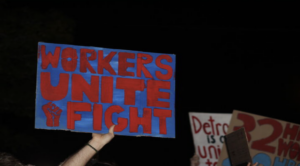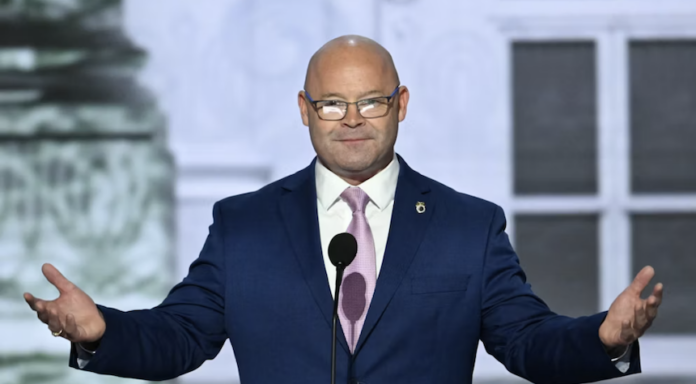Big Labor cannot deny that the Republicans could win on Election Day, as the Democratic Party scrambles for votes to support a presidential candidate yet to be determined.
In response, the American government unions have adopted two strategies.
To keep unionists loyal, the National Education Association and American Federation of Teachers have redoubled their commitment to Democrats.
Some see an opportunity in the Republican Party’s desire to reclaim blue-collar votes, which could be the difference between a Democrat win or a loss this November.
Sean O’Brien is the President of the International Brotherhood of Teamsters, and the first major union leader to speak at the Republican National Convention. He was one of the few who broke with the political consensus of Big Labor, insisting on the fact that blue-collar American workers “are not beholden to any party or anyone.”
O’Brien believes that by appearing neutral, he will be able to deal a symbolic defeat to the Democratic candidate for this year. This, in turn, may encourage Republicans to compromise on their principles of worker protections, which are branded as anti-union by Big Labor, to gain a slice of blue-collar votes.
O’Brien may claim to represent America’s workers, but since 2019, more than 99 percent of the union’s spending on political campaigns and causes has gone to Democratic candidates and causes. This has led hundreds of thousands of blue-collar Teamsters to quit their membership.
The Teamsters, rather than evaluate union practices that drive workers away, hired three expensive law firms the day after Sean gave his speech at the RNC to sue the Freedom Foundation for the crime of inviting his members to leave the union.
Do you not believe me? You can read the case here.
O’Brien’s goal in appealing to Republicans as workers leave Teamsters’ ranks is to overturn state right-to-work laws. These laws give workers the freedom to decide whether to join a union. This has been a “priority” of the Teamsters for many years, and most recently with the passage of the Protecting the Right to Organize Act.

O’Brien’s ability to negotiate will be revealed by the GOP’s naivety if he can convince a potential Republican administration that they should not push for pro-worker reforms, in exchange for an inconsequential lack of endorsement.
O’Brien is not interested in the American worker’s financial interests, but rather in the financial interests of Big Labor.
Both are fundamentally different.
If the right-to-work laws were repealed, millions of Americans would be forced to join unions. This would ensure a constant stream of income, no matter how poor their services are, for Big Labor.
Big Labor’s commitment to accelerating organization by circumventing workers’ protections during union elections, protecting the unions’ right to deduct dues forcibly from employees’ pay, and spending this revenue on a lopsided political agenda does little to help American workers.
O’Brien, along with his counterparts across the country, should instead be committed to ensuring employees are compensated fairly for their work, and that all workers in America have the right to decide whether or not to pay union dues.
Republicans should be cautious as November 5 approaches. Just like the corporations O’Brien criticized, Republicans must not support a union that, like those corporations, “abandons local communities to increase their bottom line.”




